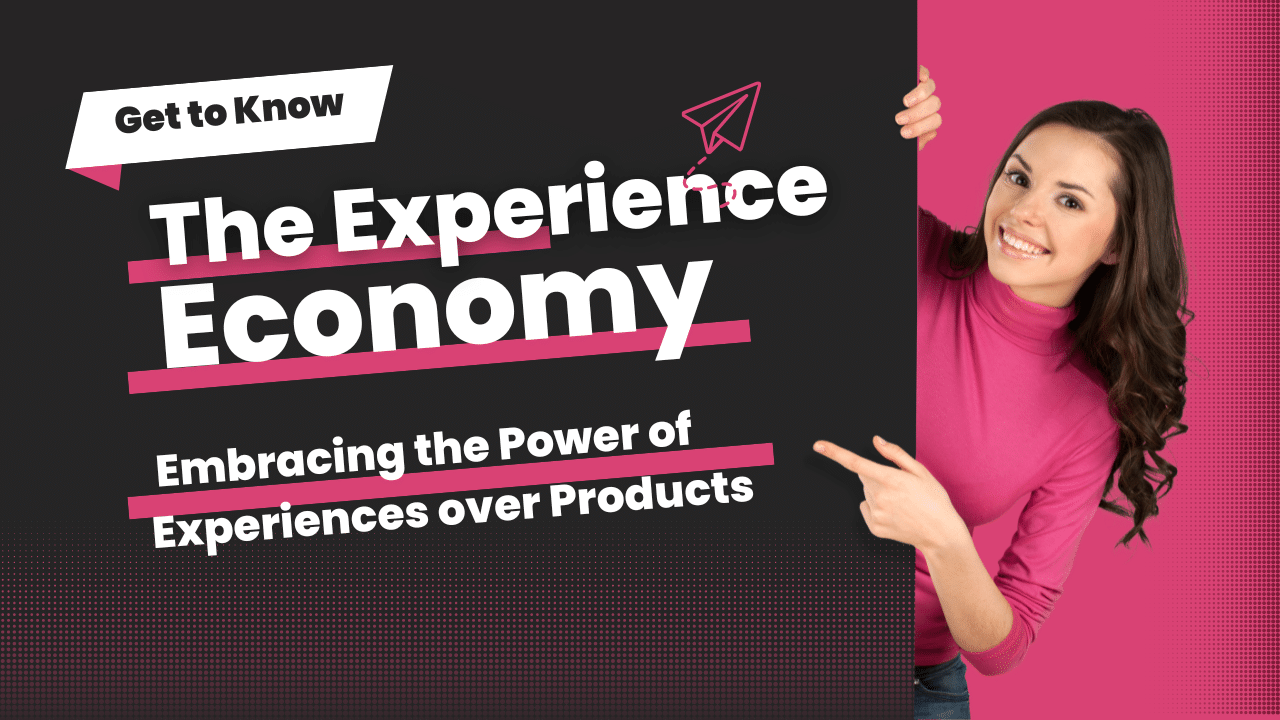The Experience Economy: Embracing the Power of Experiences over Products

Introduction
In the world of consumerism, a remarkable shift has taken place over the past few decades. People are no longer just interested in buying products and services; they seek meaningful and memorable experiences. Welcome to the Experience Economy, a revolutionary concept transforming how businesses engage with customers. In this podcast/blog post, we will explore the rise of the Experience Economy, delve into various industries that have embraced this paradigm shift, and understand the benefits and strategies behind adopting an experiential mindset.
The Evolution of the Experience Economy
The seeds of the Experience Economy were planted in the late 1990s when authors James H. Gilmore and B. Joseph Pine II published their book “The Experience Economy: Work Is Theatre & Every Business a Stage.” This groundbreaking work introduced the idea of businesses shifting their focus from merely providing products and services to crafting unique and memorable customer experiences.
In the Experience Economy, consumers crave more than just functional benefits; they desire personal and emotional connections with the brands they engage with. This shift in consumer behavior has been facilitated by technological advancements, which have allowed businesses to create immersive and shared experiences like never before.
Examples of Experience Economy Industries
Numerous industries have successfully adapted to the Experience Economy, leveraging experiential strategies to win over their target audiences:
- Hospitality: Boutique hotels and accommodations have mastered creating distinct vibes and environments that cater to guests’ preferences, making their stays unforgettable.
- Retail: Brick-and-mortar stores have transformed into engaging spaces where customers can experience products firsthand, turning shopping from a transactional activity into an immersive journey.
- Events: From music festivals to comic conventions, experiential events offer attendees a chance to be part of something extraordinary, fostering lasting memories and strong emotional connections.
- Tourism: Immersive travel experiences and eco-tourism have gained immense popularity as travelers seek authentic and enriching adventures beyond conventional sightseeing.
- Bowling Alleys, Laser Tag, Escape Rooms, Axe Throwing, Batting Cages, Top Golf, Indoor glow in the dark miniature golf, places to go and smash stuff and break stuff. These types of businesses have switched up the game and turned something simple into an “experience”
Benefits of Adopting an Experience Mindset
Embracing the Experience Economy offers several benefits for businesses:
- Memorable and Emotional Connections: Experiences evoke emotions and create lasting memories, fostering a deeper connection between customers and brands.
- Loyalty and Brand Advocates: Satisfied customers become loyal brand advocates, sharing their positive experiences with others and contributing to word-of-mouth marketing.
- Premium Pricing: Unique and extraordinary experiences can command premium pricing, enabling businesses to increase profitability.
- Differentiation from Competitors: In a crowded marketplace, memorable experiences are a powerful differentiator, setting businesses apart.
- Engagement across Multiple Touchpoints: An experiential approach allows businesses to engage with customers at various touchpoints, enhancing overall customer satisfaction.
- Create a comfortable space, serve Champagne to high end clients and more!
Tips for Implementing Experiential Strategies
To thrive in the Experience Economy, businesses should consider the following strategies:
- Know Your Target Audience: Understanding your audience’s preferences and desires is crucial in crafting experiences that resonate with them.
- Leverage Storytelling: Storytelling adds depth and meaning to experiences, creating emotional narratives that customers can connect with.
- Make It Interactive and Customizable: Involve customers in the experience, allowing them to tailor elements to their preferences, making it a personal journey.
- Utilize Technology: Augmented reality, virtual reality, and other tech innovations can enhance the immersive aspect of experiences and enable shared participation.
- Focus on End-to-End Experience: Ensure a seamless and consistent experience across all customer touchpoints, from initial engagement to post-purchase interactions.
Key Takeaways and Conclusion
The Experience Economy is not a passing trend but a fundamental shift in consumer behavior and expectations. Adopting an experiential mindset becomes imperative as businesses adapt to this new landscape. By creating memorable, meaningful, and immersive experiences, brands can build strong emotional connections with their customers, foster loyalty, and differentiate themselves in the market.
In conclusion, we encourage businesses to embrace the Experience Economy fully. Let us remember that we are no longer just selling products or services; we are selling experiences that can touch the hearts and souls of our customers. As you embark on your journey into the Experience Economy, always prioritize creating unforgettable moments and enriching lives through exceptional experiences.
Closing Notes and Call to Action
Thank you for joining us on this exploration of the Experience Economy. We hope this podcast/blog post has inspired you to rethink your business approach and consider the power of experiences in shaping the future of consumer interactions. To thrive in the Experience Economy, start by understanding your customers, leveraging storytelling, embracing technology, and delivering experiences that will impact those you serve. As we move forward, let us continue to prioritize creating remarkable, emotionally resonant experiences that enrich the lives of our customers and elevate our businesses to new heights. Together, let’s make the Experience Economy a transformative force in commerce.








